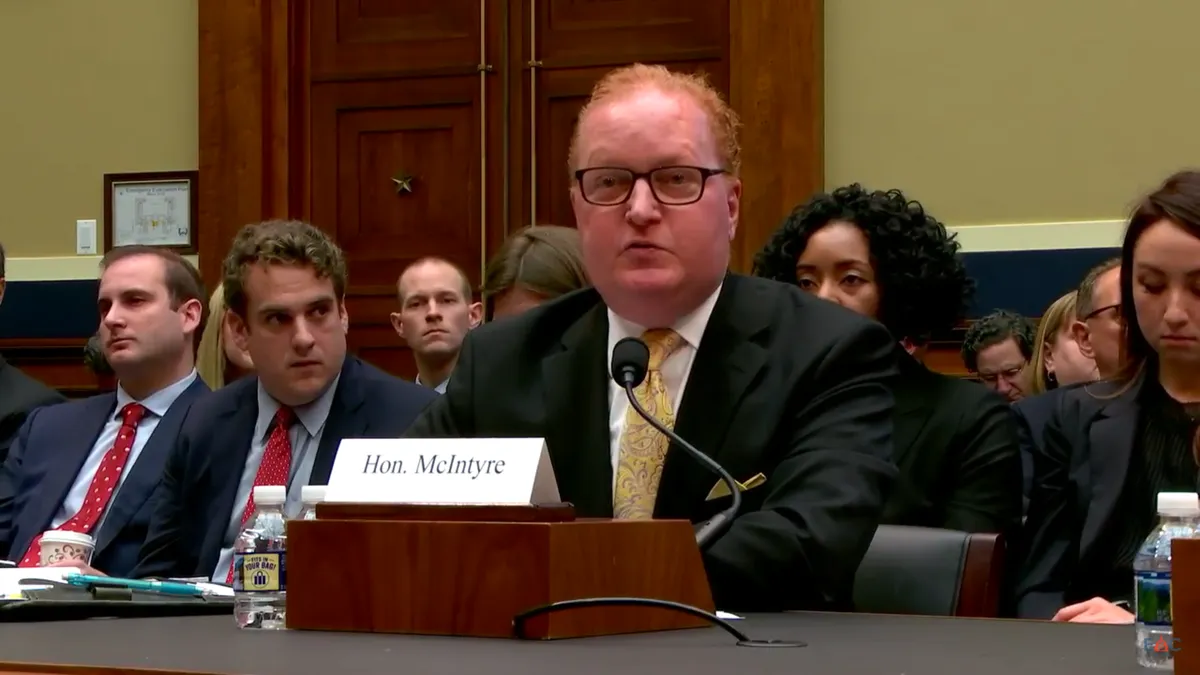Dive Brief
- The Federal Energy Regulatory Commission could take action to keep uneconomic power plants online if it perceives an entire category of generation resources, such as coal and nuclear, could permanently retire, the agency’s chairman told Congress on Tuesday.
- FERC Chairman Kevin McIntyre said the agency is committed to an “all-of-the-above” energy strategy, and the prospect of a category of resources retiring would be "harmful to American interests." Concern for whole-category retirement is common among coal and nuclear lobbies, but not reflected in reliability assessments from regional grid operators.
- The hearing at the House Energy and Commerce Committee also touched on numerous issues of state versus federal jurisdiction, including state power subsides, pipeline approvals and authority over distributed energy resources. FERC is expected to take official action to start McIntyre’s policy review of pipeline approvals at its Thursday meeting.
Dive Insight
McIntyre’s adoption of the category retirement narrative at Tuesday’s House hearing could indicate he is receptive to the arguments of coal and nuclear plant operators, who have long argued low wholesale power prices could lead to their elimination in restructured markets.
Multiple times during the hearing, McIntyre voiced concern about the permanent loss of coal or nuclear plants, saying the issue is “very much in the scope” of the commission’s grid resilience docket, set up early this year when regulators rejected a coal and nuke bailout request from the Department of Energy.
“Every public servant in America says all-of-the-above,” McIntyre told Utility Dive after the hearing. “If we mean it, should we be troubled of the prospect of any category of generating resources going the way of the dodo bird? If the answer to that question is yes, we have a legitimate basis to be concerned about that.”
That prospect is one often mentioned by operators of failing coal and nuclear plants. In February, the CEO of FirstEnergy warned that without action “there will be no more coal or nuclear plants left in these markets.” The utility, as well as mining companies and some nuclear operators, made similar arguments in their comments to FERC on DOE’s proposed subsidy plan.
The sentiment is not reflected, however, in reliability assessments from the nation’s grid operators, who told FERC planned retirements do not pose a threat. The coal and nuclear lobbies, along with their allies, were the only ones to push the categorical retirement argument, a fact not lost on the FERC chairman.
“I don’t quarrel with what you just said there,” McIntyre said when asked about the comments. “Obviously [plant owners] taking steps that they regard are in their interests.”
Back in October, Commissioner Neil Chatterjee, who was then FERC chair, told Utility Dive that the concerns of plant owners made him push for a short-term bailout for coal and nuclear generators. McIntyre said despite raising the argument, that is not what is happening here.
“I think we have to look at the question of resilience from the standpoint of are there instances we can foresee where all-of-the-above truly is going to be necessary to keep the lights on,” he said, “and if so, what steps should we be taking to avoid any scenario like that?”
McIntyre said that he personally sees “no imminent threat” that coal and nuclear plants will disappear from the PJM market — the target of the DOE proposal. But he has to address the issue, he said, because DOE raised it in the original Notice of Proposed Rulemaking (NOPR) filed with FERC to support the generators.
“If you read the DOE NOPR you'll see that those concerns are reflected there,” he said. “Those were concerns that we had to accept at face value and address in our decisionmaking there you saw reflected there in the January order.”
In fact, the DOE NOPR addressed the reliability impacts of categorical retirement in relation to the 2014 Polar Vortex, which FERC and regional grid operators have since addressed through Capacity Performance rules and other reforms. And FERC’s January order to reject the NOPR did so in part because regulators said DOE did not prove its reliability claims.
Even so, McIntyre said he considers the categorical retirement question fair game for the resilience docket.
“I think it's fairly on the table within the scope of our intentionally broad inquiry,” he said.
Not all FERC members shared McIntyre’s concern. During the hearing, Commissioner Cheryl LaFleur pointed out that each regional grid operator currently has Reliability-Must-Run (RMR) tariffs that necessitate a reliability assessment whenever a resource proposes to retire.
“If there’s a change needed in those tariffs we’ll look at them but I think that’s a good place to start,” she said.
Commissioner Robert Powelson questioned the logic of the categorical retirement argument. There are many nuclear plants that can still clear wholesale markets today, he said, but some smaller facilities like Three Mile Island in Pennsylvania are struggling.
“It's because 100 miles north [of that plant] is gas coming out of the ground at $1.21/mmBtu and a power plant that has a much lower cost to run and can provide baseload power to the grid,” Powelson said.
Commissioner Neil Chatterjee, on the other hand, said that he expects FERC may soon find that changes are needed to existing market tariffs to better value the resilience attributes of coal and nuclear generators. While he received criticism for floating a short-term bailout, Chatterjee said that “as we look back in time maybe it would have been the right thing to do."
Plant owners may not need to wait for FERC to act. The Department of Energy is currently reviewing an emergency bailout request from FirstEnergy that would supercede FERC’s NOPR rejection, and Secretary of Energy Rick Perry has often repeated the categorical retirement line, saying national security could be at risk if more plants go offline.













